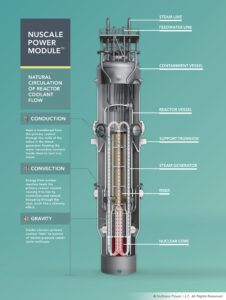This is progress. Only twenty members of the Virginia Senate voted Tuesday to ignore a key tenet of utility ratemaking and put utility stockholders and profits ahead of consumer protection. Usually when the utilities persuade the General Assembly to do that to Virginia consumers, they get a bigger vote margin than 20-16.*
Senate Bill 454 allows Virginia’s two monopoly electricity providers to spend undetermined millions of dollars on planning and developing small modular nuclear reactor projects and get it all paid by consumers, with a profit margin. But there is no guarantee any such plants will ever be built, and no other power plants built in Virginia have gotten this kind of up-front financial guarantee before the State Corporation Commission ruled them in the public interest.
Senate Majority Leader Scott Surovell, D-Fairfax, assured his fellow senators that the State Corporation Commission would retain the full power to say yea or nay on this idea. “We’ve given the SCC complete discretion,” he said.
Surovell is now the legislature’s energy czar, chairing the newly reinvigorated joint Commission on Electric Utility Regulation. Perhaps he doesn’t understand exactly what the bill does and doesn’t do. If he is fully aware, he misspoke.
The bill (text here) gives the SCC discretion to decide which of the development costs are reasonable and prudent, which might be a bill from an engineering firm, the cost of reviewing designs, site surveys, or the staff time spent on preparing a federal application. Gold-plating of those bills can be stopped. But the SCC will be unclear as to whether it can say no to the whole shooting match.
If you want the bill to give the SCC the full power to say no to doing this at all, then I propose the following amendment:
Nothing in this section shall limit the Commission’s discretion to determine if recovering such project costs from ratepayers without a project approval pursuant to subsection D of §56-580 is reasonable, prudent and in the public interest.
That might alleviate concerns that the bill is just about the money, as was a similar bill in 2014 dealing with the development costs of North Anna 3 (detailed here.) That nuclear facility was never built. Some of us think the utility knew up front it wasn’t going to be built and may have that outcome in mind now.
A House bill allows charging customers for advance funding for an unapproved SMR for Appalachian Power Company in Western Virginia, but not for Dominion. It received a stronger positive vote on passage. Merging the two bills into one will be the focus of intense lobbying now. An amendment to reinforce the SCC’s full authority is in order on the House bill, too.
A year ago, the Assembly got the same assurances that the SCC would remain free to say yes or no on another regulatory innovation that added costs to consumers. Legislators were told that Dominion Energy Virginia’s proposal to pay off $1.2 billion in fuel costs over multiple years, with compound interest in the hundreds of millions, was not being dictated by the Assembly when it passed enabling legislation.
But many legislators who voted for the bill then showed up at the SCC and testified in favor of the bonding program. Dominion was free to argue in court that the Assembly had endorsed the approach. Yes, the SCC could have chosen to impose all the unpaid costs on one year’s bills and exploded the rates for that year, but the pressure not to was intense.
In that case, not collecting the money at all was never an option. In this case, not moving forward with an SMR development project at all is a valid option. If the message from the Assembly now is, “we want the SCC to decide if this is a good idea,” make it clear in the bill text and make it clear in the House debate.
Otherwise, the message in this bill from the Assembly to the SCC is, we want you to do this. We are so fond of the SMR idea, we want you to gamble the ratepayer’s money. That is exactly how the utilities will frame this when the case is before the SCC, as a policy decision by the legislature.
Below is the heart of the bill as it now reads. Where does it say the SCC can say no? It just says the SCC can review and approve the various items of cost.
Such utilities may petition the Commission for SMR project development cost recovery along separate development phases and, if the Commission determines such projected or actual project costs to be reasonable and prudent, any such project costs may be recovered by such utilities on a timely and current basis from customers prior to any approval pursuant to subsection D of § 56-580 or the commercial operation date of any such SMR facility.
Also this:
Nothing in this section shall limit the Commission’s discretion to determine whether the proposed SMR project development costs are reasonable and prudent.
So, it would be simple to slip in that sentence proposed above. The law should be clear that the SCC can and must decide based on sworn testimony whether putting the cart of costs before the horse of a full approval process is “in the public interest.”
If (when) the amendment is dismissed and resisted, perhaps a few more of the legislators will wake up to what is going on.
* Senator Lashrecse Aird, D-Petersburg, voted aye but then informed the clerk she intended to vote nay. That would have made it 19-17, so less than half the Senate actually voted for this bill. But it passed. She could have moved to reconsider the first vote, but didn’t. The four senators who “took a walk” were the key to passage.
